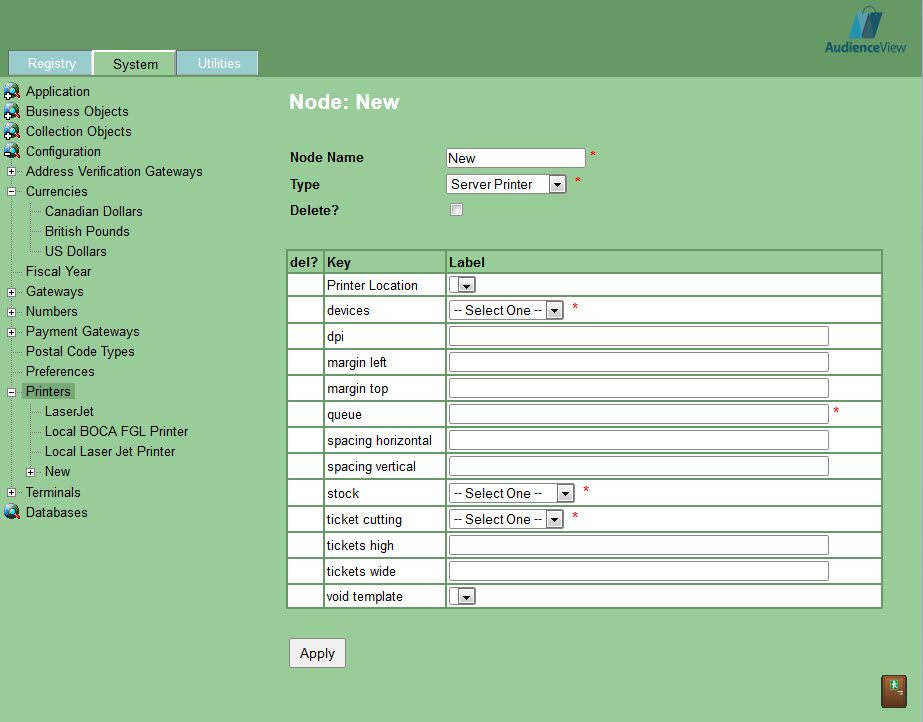Whenever you add a printer, the printer will be available the next time you log in. You can add printers using the Registry - System::Configuration::Printers node. For more information, refer to Configuring Printers.
|
Caution Before adding a printer, contact Support to install and configure the printer on every server using Windows' Printers and Faxes. |

The printer nodes contain the following properties:
Field |
Description |
||||
Node Name |
Enter a unique name to identify the printer in the Registry (Printer1). The 'Node Name' cannot contain spaces. |
||||
Type |
When adding a new printer, select the type of printer that will be used: •Server Printer: A network-connected printer (Server Printer was formerly known as Local). •Gateway: A Fortress printer (Gateway was formerly known as Remote). •Client: A browser-based printer. |
||||
Printer Location |
By setting a 'Location' and assigning it to a group, you can control which printer (and payment terminal) options appear to users.
The physical location where the printer is situated (Window 1, Gate 3). By assigning 'Locations' to printers and (payment terminals), you can better control the available printers. When a user selects this location from the Change Your Settings dialog box (SHIFT+ S), only the printers assigned the location will be available. If there is only one valid printer (or payment terminal) available to the user, it is selected by default. If a 'Location' is set, then the printers with that location and all of the printer without locations will be available to the user. If no location is set on the user, then only the printers that do not have a location will be available.
Locations are added using the Location list. |
||||
Devices |
Select the type of device this printer represents. ▪FGL2: Friendly Ghost Language, version 2. This option is available for the Server Printer and Client printer 'Type'. ▪FGL4: Friendly Ghost Language, version 4. This option is available for the Server Printer and Client printer 'Type'. ▪Windows: Windows-compatible printers. This option is available for the Server Printer printer 'Type'. ▪PDF: Portable Document Format. This option is available for the Client printer 'Type'. When using PDF, ensure that the 'DPI' is set to 72. |
||||
DPI |
Dots per inch (DPI) of your printer’s output (200 or 300). The application determines which DPI settings to use as follows: 1.Settings from the printer’s Windows device driver, if any. 2.Settings in the Registry for the printer, if any. 3.Settings on the ticket template’s device.
|
||||
Label |
The user-facing name of the printer. |
||||
margin left |
Sets the tickets margins for n x n printing. |
||||
margin top |
Sets the tickets margins for n x n printing. |
||||
Queue |
If this is a local printer you need only enter its name. If the printer is not local, enter the direct path and name of the printer, as it appears in MS Windows. To find the queue name, go to Windows’ Printer and Faxes window, right-click on the appropriate printer, select Properties and copy the text in the top field of the General tab. Paste this text into the 'Queue' field. The value entered in this field cannot contain spaces. |
||||
spacing horizontal |
For n x n printing (printing multiple tickets per page), this specifies the horizontal space between tickets. This is only used if you specify values for tickets high and tickets wide. |
||||
spacing vertical |
For n x n printing (printing multiple tickets per page), this specifies the vertical space between tickets. This is only used if you specify values for tickets high and tickets wide. |
||||
Stock |
Select the appropriate default stock size for this printer. |
||||
ticket cutting |
For FGL printers, this specifies when to cut tickets. •None: Indicates no ticket printing. •Per Order: Indicates that tickets are to be cut after each order. •Per Ticket: Indicates that tickets are to be cut after each ticket. |
||||
tickets high |
For n x n printing (printing multiple tickets per page), this specifies the number of tickets that are to be printed vertically on the page.
|
||||
tickets wide |
For n x n printing (printing multiple tickets per page), this specifies the number of tickets that are to be printed horizontally on a page.
|
||||
void template |
For n x n (printing multiple tickets per page), this prints Void across unused tickets on the sheet of tickets (sports season tickets).
|

